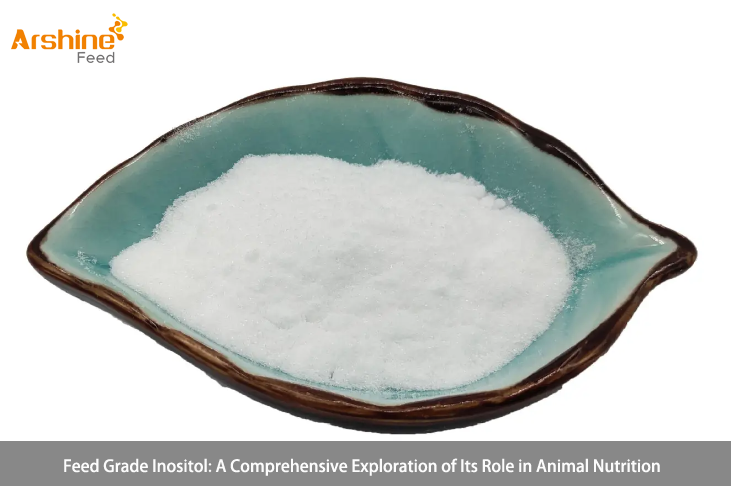Inositol, a naturally occurring carbohydrate, is a vital compound that plays a pivotal role in the nutrition and health of animals. It is particularly valuable when used as a feed additive in animal diets. In this comprehensive exploration, we delve into the multifaceted world of feed-grade inositol, understanding its significance, benefits, and applications in animal nutrition, and how it contributes to the overall well-being and productivity of various species.
Inositol: A Fundamental Nutrient
Inositol, often referred to as vitamin B8, is a sugar alcohol compound classified as a member of the vitamin B complex. While it's not officially recognized as a vitamin, inositol is essential for proper cellular function in both animals and humans. It is found naturally in many foods and can be synthesized by the body, but supplementation with feed-grade inositol is often necessary to meet the specific dietary needs of animals.
Inositol plays a crucial role in numerous physiological processes in animals, including:
-
Cell Membrane Integrity:Inositol is a key component of cell membranes. It helps maintain membrane integrity, ensuring that cells function correctly and retain their structural integrity.
-
Signal Transduction:Inositol is involved in cellular signal transduction pathways, enabling cells to respond to external signals and regulate various processes such as growth and metabolism.
-
Lipid Metabolism:Inositol is integral to lipid metabolism. It plays a role in the breakdown and transport of fats in the body, contributing to overall energy balance.
-
Neurotransmitter Function:Inositol is a precursor for certain neurotransmitters, such as serotonin, which are essential for proper brain function and mood regulation.
-
Osmoregulation:Inositol also participates in osmoregulation, helping cells maintain their water balance and respond to changes in osmotic pressure.
Benefits of Feed-Grade Inositol as a Feed Additive
Feed-grade inositol offers a range of benefits when incorporated into animal diets. These advantages are particularly significant in animal agriculture, where optimized nutrition directly influences animal health, growth, and productivity.
1. Improved Cell Membrane Integrity:
- Enhanced Cell Function:Inositol reinforces cell membrane structure and function, contributing to the overall health and longevity of cells. This is crucial for various physiological processes, including nutrient transport and waste removal.
2. Enhanced Nutrient Absorption:
- Efficient Nutrient Uptake:Proper cell membrane integrity supported by inositol allows for efficient absorption of essential nutrients, ensuring that animals can derive maximum benefit from their diet.
3. Stress Mitigation:
- Stress Response:Animals often encounter stressors, including environmental changes, handling, and transportation. Inositol helps animals better adapt to stress by supporting cellular responses and maintaining overall well-being.
4. Improved Reproduction:
- Reproductive Health:Inositol is known to play a role in reproductive health in animals. Adequate inositol levels can positively impact fertility and reduce the incidence of reproductive disorders.
5. Immune Function:
- Enhanced Immune Response:Inositol contributes to immune system function, aiding animals in mounting effective immune responses to infections and diseases.
6. Energy Metabolism:
- Energy Production:Inositol supports energy metabolism by facilitating the breakdown and utilization of fats, contributing to overall energy balance.
7. Neurological Health:
- Neurotransmitter Function:Inositol is involved in the synthesis of neurotransmitters, which are essential for proper nervous system function. Ensuring adequate inositol levels is crucial for neurological health.
8. Nutritional Optimization:
- Balanced Nutrition:Inositol helps ensure that animals receive a well-rounded and balanced diet. Its inclusion as a feed additive can contribute to overall nutritional optimization.
Applications in Animal Agriculture
Feed-grade inositol is widely used in animal agriculture to harness its benefits and support the well-being and productivity of various species, including:
1. Poultry Farming:
- Egg Production:Inositol supplementation in poultry diets is known to enhance egg production and quality, making it a valuable addition to layer feed formulations.
2. Swine Production:
- Sow Reproduction:Inositol is beneficial for sow reproduction, improving fertility rates and reducing the risk of reproductive issues.
3. Dairy Farming:
- Milk Production:Inositol supplementation can positively impact milk production in dairy cattle, contributing to increased milk yields.
4. Aquaculture:
- Fish and Shrimp Growth:Inositol is used in aquaculture to promote the growth and overall health of fish and shrimp species.
5. Companion Animals:
- Pet Nutrition:Inositol is also relevant in pet nutrition, where it contributes to the well-being of companion animals.
Forms of Feed-Grade Inositol
Feed-grade inositol is available in various forms to suit different dietary requirements and feeding methods. Common forms include:
-
Powdered Inositol:This form can be easily mixed into feed formulations and is suitable for both large-scale animal agriculture and smaller-scale pet nutrition.
-
Liquid Inositol:Liquid formulations of inositol are versatile and can be added to drinking water or applied as a spray on feed.
-
Pelleted Inositol:Pelleted forms of inositol are convenient for specific feeding methods and can be incorporated into complete feed pellets.
Conclusion
Feed-grade inositol, derived from the essential nutrient inositol, offers a multitude of benefits when used as a feed additive in animal nutrition. Its impact on cell membrane integrity, nutrient absorption, stress mitigation, reproduction, immune function, energy metabolism, and neurological health makes it an indispensable component of animal diets in various sectors of animal agriculture. By incorporating feed-grade inositol, producers can enhance the health, well-being, and productivity of their animals, ultimately contributing to the sustainability and success of the industry. As ongoing research continues to uncover new applications and benefits, the role of inositol in animal nutrition remains a dynamic and promising field.
